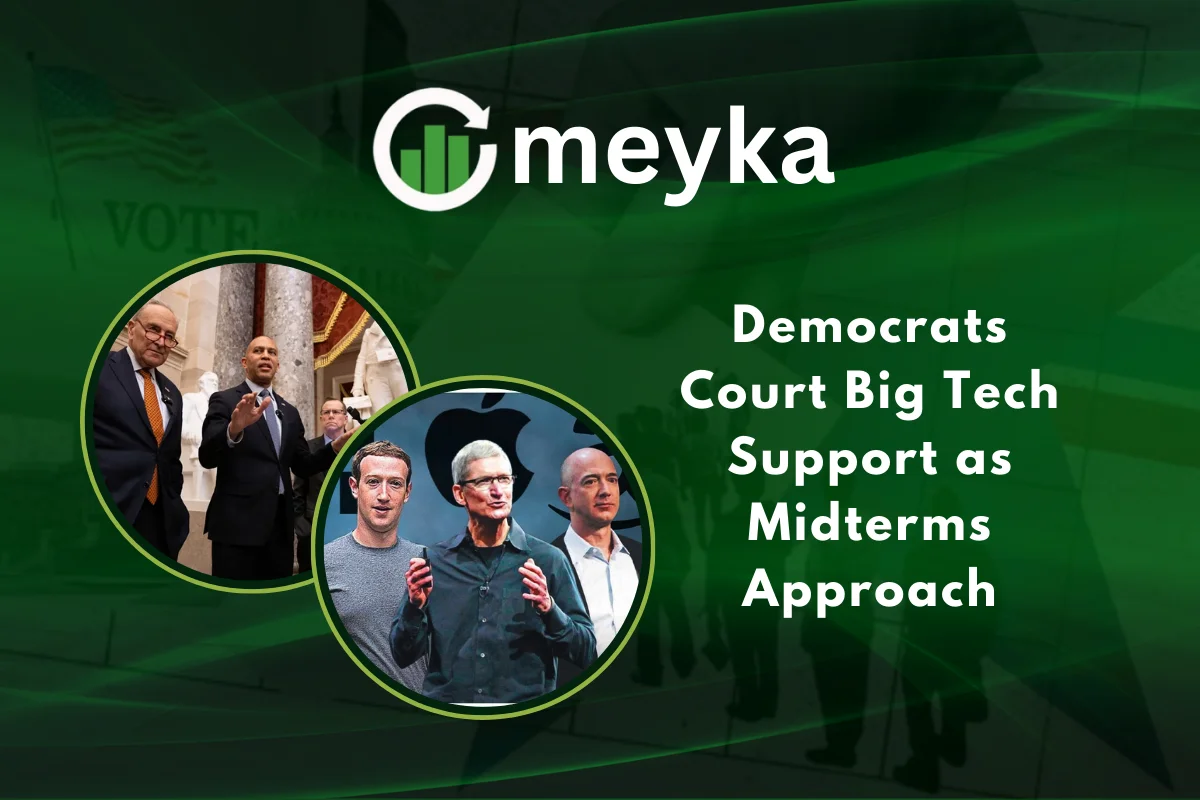Democrats Court Big Tech Support as Midterms Approach
As the midterm elections draw closer, the relationship between Democrats and Big Tech is gaining renewed attention. Both sides see potential benefits. For Democrats, technology firms offer campaign donations, digital tools, and messaging platforms.
For Big Tech, political partnerships can help secure favorable regulations and safeguard innovation. This evolving dynamic could play a decisive role in shaping both policy and election outcomes.
The Strategic Role of Big Tech in Modern Politics
Over the past decade, Big Tech has moved from being a peripheral player to becoming central in American politics. Companies like Google, Meta, Apple, and Amazon have vast influence not only over the economy but also over how information flows to voters.
Social platforms shape political conversations, search engines influence visibility, and digital advertising helps campaigns target voters with precision.
Democrats, aware of the stakes, are working harder to maintain ties with Silicon Valley leaders. While these relationships have not always been smooth, the mutual need for cooperation is undeniable.
The industry requires allies in Washington to navigate scrutiny over privacy, data use, and antitrust measures. At the same time, politicians lean on technology companies for outreach and fundraising advantages.
Why Democrats Need Big Tech Ahead of Midterms
The midterms will test the party’s ability to communicate effectively with a fragmented electorate. Traditional campaign strategies alone no longer suffice. Instead, digital-first approaches powered by Big Tech platforms are key to voter engagement.
Targeted digital advertising enables Democrats to reach younger voters, who increasingly rely on social media for political updates. Online donation platforms, many powered by Big Tech infrastructure, allow campaigns to fundraise more efficiently. Data analytics provided by these firms also allows campaigns to tailor messages to specific demographics.
Tensions Between Regulation and Partnership
The relationship, however, is not without tension. Many Democrats have criticized Big Tech for issues ranging from misinformation to monopolistic behavior. Lawmakers have introduced bills aimed at reining in the market power of companies like Amazon and Google. President Joe Biden himself has urged stronger antitrust enforcement and more protections for consumer data.
Yet, when election season arrives, practical politics often softens the edges of this rhetoric. Campaigns understand that cutting ties with tech giants could hurt voter outreach and fundraising. This creates a delicate balance: pushing for reforms while still depending on these same companies for electoral success.
The Financial Contributions of Big Tech Executives
Another layer of influence comes through political donations. Executives and employees at major tech firms have historically leaned Democratic in their contributions. This financial backing can play a critical role in tight races, especially when Republicans have focused on courting traditional industries such as oil, manufacturing, and agriculture.
While Democrats receive a larger share of tech money, both parties benefit from these donations. However, the closer alignment of values between Silicon Valley culture and Democratic policies on climate, social issues, and immigration strengthens the bond.
AI, Stocks, and the Expanding Tech Footprint
The growing prominence of AI stocks adds another dimension. Artificial intelligence, already integrated into search engines, social media algorithms, and cloud computing, is becoming central to national competitiveness. Democrats recognize that supporting innovation while regulating responsibly will help position the U.S. as a leader in global technology.
Investors following the stock market trends see AI companies gaining momentum, and political backing could further accelerate this. By engaging with Big Tech, Democrats align themselves with industries that promise both growth and jobs. For voters, this translates into optimism about future economic opportunities, particularly in regions where technology hubs are expanding.
Republican Pushback and Political Divide
Republicans, meanwhile, often criticize Big Tech for what they see as censorship and bias against conservative voices. This has become a rallying point for the party, with promises to hold tech giants accountable. Their rhetoric appeals to voters who distrust elite institutions and prefer stricter oversight of Silicon Valley.
This political divide makes the midterms even more critical for Big Tech. If Democrats hold influence, the industry may face regulatory pressure but also maintain collaborative ties. If Republicans gain more power, tech firms could see aggressive hearings and legal actions targeting their content moderation policies.
The Broader Implications for Voters
For ordinary voters, the interplay between Big Tech and Democrats affects more than just campaign ads. It influences data privacy protections, online speech, antitrust enforcement, and even the accessibility of broadband in rural areas. The policies shaped by these relationships will determine how technology evolves in everyday life.
As voters head to the polls, they may not always see the direct hand of Big Tech, but its impact is undeniable. From targeted ads to the design of donation platforms, the digital architecture surrounding elections bears the fingerprints of Silicon Valley.
Conclusion
The Democrats’ courtship of Big Tech ahead of the midterms reflects both opportunity and compromise. While regulation debates continue, both sides understand the benefits of cooperation. For Democrats, technology companies provide vital tools and resources to compete in elections.
For Big Tech, political alliances help ensure its long-term growth in a regulatory environment filled with challenges.
FAQs
Democrats rely on Big Tech for digital outreach, fundraising, and voter targeting. Technology firms also provide financial support and align with many Democratic policy goals.
Big Tech drives major indexes and is heavily tied to innovation, especially in areas like artificial intelligence. AI stocks are seen as growth leaders, attracting strong investor interest.
The main risks include stricter antitrust laws, data privacy regulations, and political scrutiny over content moderation. These could affect both their business models and their stock performance.
Disclaimer:
This content is made for learning only. It is not meant to give financial advice. Always check the facts yourself. Financial decisions need detailed research.






